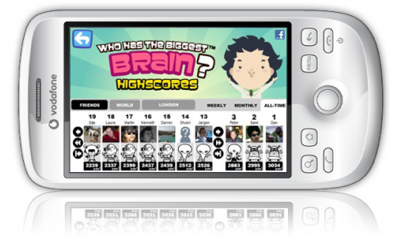
Now, like competitors including Zynga and SGN, it is expanding by pushing these games to mobile platforms, driving adoption through its existing popularity on Facebook. It has successfully launched a few apps on the iPhone in recent months, using new Facebook data-sharing service Connect for the iPhone so friends can play games on the iPhone against friends on Facebook’s web site. And, a couple weeks ago, it got an early start building for the still-young Android mobile platform, launching its an app for playing popular Who Has The Biggest Brain quiz game.
[aditude-amp id="flyingcarpet" targeting='{"env":"staging","page_type":"article","post_id":108264,"post_type":"story","post_chan":"none","tags":null,"ai":false,"category":"none","all_categories":"business,","session":"B"}']Playfish has ported games that only focus on core social features; it can immediately tie those features back in to its social networking apps. This is in contrast to SGN, which has focused on building games around mobile-specific features, like iGolf where you use the iPhone’s accelerometer to swing and hit virtual golf balls, and is only more recently tying those games to social networks. On the iPhone, Playfish has seen over 90 percent of players use Facebook Connect to play with their Facebook friends, chief operating officer Sebastian de Halleux. Its social strategy could be great for Android, too. Not many people have Android devices right now, but Playfish’s games will be social anyway because users can play against their friends back on Facebook. Playfish went out of its way to do this, by building its own version of Facebook Connect — Facebook itself hasn’t launched Connect for Android yet.
Syncing an empire
You can see how Playfish’s mobile plans fit into its overall vision for social gaming. “Suddenly, through social networking platforms, building games is less about hit creation and more about intellectual property creation, and nurturing titles,” de Halleux tells me. First, you build a game that people love, then you figure out how to iterate on it to keep it popular, and make money from it.
AI Weekly
The must-read newsletter for AI and Big Data industry written by Khari Johnson, Kyle Wiggers, and Seth Colaner.
Included with VentureBeat Insider and VentureBeat VIP memberships.
Founded in October of 2007 by veterans of mobile game developer Glu Mobile, Playfish has been following this vision for years. Its first game, Who Has The Biggest Brain, launched that December. This is more than half a year after Facebook’s developer platform launched. The company’s successful late start is a testament to its game quality. Most other companies that are big on Facebook today saw key growth in the first few months of the platform, before Facebook implemented heavy restrictions on “viral channels” such as how many app notifications users can send to friends, or how frequently app activity might appear in users’ “news feed” homepages.
Playfish, in fact, has made a point of not trying to get viral growth, de Halleux tells me — its games tend to de-emphasize activities like inviting all of your friends, and instead try to make the games themselves so fun that users want to invite their friends to share the experience. In Who Has the Biggest Brain, an app that today has more than three million monthly active users on Facebook alone, you can start playing its brain teasers, get some practice in, then challenge your friends to answer questions. In total, Playfish has some 30 million monthly active users, most of whom are on Facebook. While most rivals try out dozens of games, hoping for a hit here or there, Playfish has launched just seven games since it began in the fall of 2007, and all have made the top ten list on Facebook’s platform.
What about money? Playfish is “very profitable,” de Halleux de tells me, although he wouldn’t confirm an estimate I’d previously heard — that the company is set to make total revenues of $30 million this year. However, he did say almost all revenue was from direct payments for virtual goods and subscriptions, with a few, high-quality advertising-based offers within games through a company called TrialPay. As opposed to many games, Playfish avoids running the scammier ones — such as free ringtone ads that trick users into paying monthly subscriptions. The company is skeptical of the long-term value in some types of offers, and is focusing those that have some sort of clear value to the user, such a coupon for an in-store clothing purchase.
Everything at the company is about building a long-term business. As social networking and mobile platforms continue to merge with each other, and refine their features, expect Playfish to slowly continue expanding its line of titles — and more quickly expand its number of users and revenue. Case in point: Apple plans to introduce mobile payments for iPhone app developers this summer. This will allow Playfish to bring its existing payments-driven features to its iPhone games, and quickly begin making more money.
The London-based company has raised $21 million from angel investors, Accel Partners and Index Ventures.
[aditude-amp id="medium1" targeting='{"env":"staging","page_type":"article","post_id":108264,"post_type":"story","post_chan":"none","tags":null,"ai":false,"category":"none","all_categories":"business,","session":"B"}']
VentureBeat's mission is to be a digital town square for technical decision-makers to gain knowledge about transformative enterprise technology and transact. Learn More
